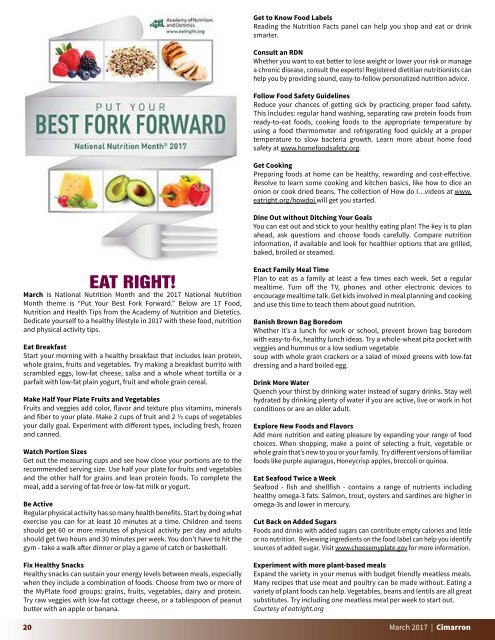Cimarron March 2017
Create successful ePaper yourself
Turn your PDF publications into a flip-book with our unique Google optimized e-Paper software.
Get to Know Food Labels<br />
Reading the Nutrition Facts panel can help you shop and eat or drink<br />
smarter.<br />
Consult an RDN<br />
Whether you want to eat better to lose weight or lower your risk or manage<br />
a chronic disease, consult the experts! Registered dietitian nutritionists can<br />
help you by providing sound, easy-to-follow personalized nutrition advice.<br />
Follow Food Safety Guidelines<br />
Reduce your chances of getting sick by practicing proper food safety.<br />
This includes: regular hand washing, separating raw protein foods from<br />
ready-to-eat foods, cooking foods to the appropriate temperature by<br />
using a food thermometer and refrigerating food quickly at a proper<br />
temperature to slow bacteria growth. Learn more about home food<br />
safety at www.homefoodsafety.org.<br />
Get Cooking<br />
Preparing foods at home can be healthy, rewarding and cost-effective.<br />
Resolve to learn some cooking and kitchen basics, like how to dice an<br />
onion or cook dried beans. The collection of How do I…videos at www.<br />
eatright.org/howdoi will get you started.<br />
Dine Out without Ditching Your Goals<br />
You can eat out and stick to your healthy eating plan! The key is to plan<br />
ahead, ask questions and choose foods carefully. Compare nutrition<br />
information, if available and look for healthier options that are grilled,<br />
baked, broiled or steamed.<br />
EAT RIGHT!<br />
<strong>March</strong> is National Nutrition Month and the <strong>2017</strong> National Nutrition<br />
Month theme is “Put Your Best Fork Forward.” Below are 17 Food,<br />
Nutrition and Health Tips from the Academy of Nutrition and Dietetics.<br />
Dedicate yourself to a healthy lifestyle in <strong>2017</strong> with these food, nutrition<br />
and physical activity tips.<br />
Eat Breakfast<br />
Start your morning with a healthy breakfast that includes lean protein,<br />
whole grains, fruits and vegetables. Try making a breakfast burrito with<br />
scrambled eggs, low-fat cheese, salsa and a whole wheat tortilla or a<br />
parfait with low-fat plain yogurt, fruit and whole grain cereal.<br />
Make Half Your Plate Fruits and Vegetables<br />
Fruits and veggies add color, flavor and texture plus vitamins, minerals<br />
and fiber to your plate. Make 2 cups of fruit and 2 ½ cups of vegetables<br />
your daily goal. Experiment with different types, including fresh, frozen<br />
and canned.<br />
Watch Portion Sizes<br />
Get out the measuring cups and see how close your portions are to the<br />
recommended serving size. Use half your plate for fruits and vegetables<br />
and the other half for grains and lean protein foods. To complete the<br />
meal, add a serving of fat-free or low-fat milk or yogurt.<br />
Be Active<br />
Regular physical activity has so many health benefits. Start by doing what<br />
exercise you can for at least 10 minutes at a time. Children and teens<br />
should get 60 or more minutes of physical activity per day and adults<br />
should get two hours and 30 minutes per week. You don’t have to hit the<br />
gym - take a walk after dinner or play a game of catch or basketball.<br />
Fix Healthy Snacks<br />
Healthy snacks can sustain your energy levels between meals, especially<br />
when they include a combination of foods. Choose from two or more of<br />
the MyPlate food groups: grains, fruits, vegetables, dairy and protein.<br />
Try raw veggies with low-fat cottage cheese, or a tablespoon of peanut<br />
butter with an apple or banana.<br />
Enact Family Meal Time<br />
Plan to eat as a family at least a few times each week. Set a regular<br />
mealtime. Turn off the TV, phones and other electronic devices to<br />
encourage mealtime talk. Get kids involved in meal planning and cooking<br />
and use this time to teach them about good nutrition.<br />
Banish Brown Bag Boredom<br />
Whether it’s a lunch for work or school, prevent brown bag boredom<br />
with easy-to-fix, healthy lunch ideas. Try a whole-wheat pita pocket with<br />
veggies and hummus or a low sodium vegetable<br />
soup with whole grain crackers or a salad of mixed greens with low-fat<br />
dressing and a hard boiled egg.<br />
Drink More Water<br />
Quench your thirst by drinking water instead of sugary drinks. Stay well<br />
hydrated by drinking plenty of water if you are active, live or work in hot<br />
conditions or are an older adult.<br />
Explore New Foods and Flavors<br />
Add more nutrition and eating pleasure by expanding your range of food<br />
choices. When shopping, make a point of selecting a fruit, vegetable or<br />
whole grain that’s new to you or your family. Try different versions of familiar<br />
foods like purple asparagus, Honeycrisp apples, broccoli or quinoa.<br />
Eat Seafood Twice a Week<br />
Seafood - fish and shellfish - contains a range of nutrients including<br />
healthy omega-3 fats. Salmon, trout, oysters and sardines are higher in<br />
omega-3s and lower in mercury.<br />
Cut Back on Added Sugars<br />
Foods and drinks with added sugars can contribute empty calories and little<br />
or no nutrition. Reviewing ingredients on the food label can help you identify<br />
sources of added sugar. Visit www.choosemyplate.gov for more information.<br />
Experiment with more plant-based meals<br />
Expand the variety in your menus with budget friendly meatless meals.<br />
Many recipes that use meat and poultry can be made without. Eating a<br />
variety of plant foods can help. Vegetables, beans and lentils are all great<br />
substitutes. Try including one meatless meal per week to start out.<br />
Courtesy of eatright.org<br />
20 <strong>March</strong> <strong>2017</strong> | <strong>Cimarron</strong>

















